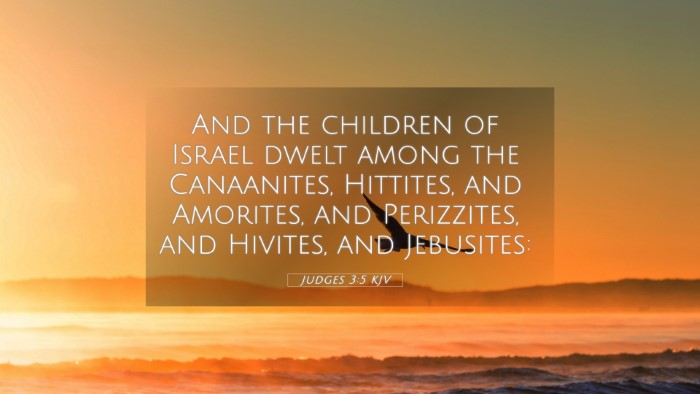Understanding Judges 3:5
Verse Citation: Judges 3:5
Verse Text: "And the children of Israel dwelt among the Canaanites, Hittites, Amorites, Perizzites, Hivites, and Jebusites."
Overview of Judges 3:5
This verse sets the stage for the context of Israel’s settlement in the Promised Land alongside numerous pagan nations. The verse depicts how the Israelites cohabitated with various nations, signifying both the fulfillment of God's promise to Abraham and the accompanying challenges posed by the surrounding peoples.
Commentary Insights
Matthew Henry's Commentary
Matthew Henry emphasizes the problem of intermingling with pagan nations. He warns that dwelling among idolaters can lead to spiritual compromise and the loss of exclusive devotion to God. This situation showcased the potential danger of Israel's interactions with the nations, foreshadowing future lapses into idolatry.
Albert Barnes' Notes
Albert Barnes provides an analysis of the significant details in the verse. He notes that the mention of various nations illustrates Israel's infiltration into Canaan and the complexities this posed for their moral and spiritual integrity. Barnes connects this with subsequent events where these relationships would lead Israel into cycles of sin and oppression.
Adam Clarke's Commentary
Adam Clarke highlights the names of the nations listed, explaining their historical and cultural contexts. Clarke argues that these nations represented significant influence in the land, and Israel’s proximity to them introduces challenges of fidelity to Yahweh. He also points out that Israel’s disobedience in fully taking possession of the land remains a theme in the conquest narrative.
Thematic Connections
This verse raises important thematic concerns about obedience, idolatry, and the struggle for faithfulness amid cultural influences. The narrative describes a critical period in Israel's history and serves as a warning about the dangers of spiritual compromise.
Bible Verse Cross-References
- Exodus 23:31-33: God's command to avoid making covenants with the inhabitants of Canaan.
- Deuteronomy 7:1-5: Instructions on how to deal with the nations in the land.
- Joshua 23:12-13: A warning that mixing with the surrounding nations will lead to their downfall.
- Judges 2:2-3: God's rebuke to Israel for not driving out the inhabitants of Canaan.
- 1 Kings 11:1-4: Solomon's compromise in marrying foreign women and worshiping their gods.
- Psalm 106:34-35: Reflection on Israel’s failure to destroy the nations and their influence.
- 2 Corinthians 6:14-17: New Testament teaching on being unequally yoked with non-believers.
Linking Bible Scriptures
In studying Judges 3:5, one finds connections throughout scripture that express the dangers of mingling with outside influences. The principle of separation is a recurring theme, intertwined with the trajectory of Israel's history of faithfulness and lapses into rebellion.
Conclusion
Judges 3:5 serves as a pivotal verse that encapsulates the tension between God's promises and Israel's choices. It positions the reader to reflect on the consequences of spiritual compromise. By examining this verse alongside related scriptures, one brings to light the importance of maintaining loyalty to God amidst societal pressures.
Tools for Bible Cross-Referencing
For further study, various tools can enhance understanding:
- Bible concordance: A directory that helps locate verses by keywords.
- Bible cross-reference guide: A resource outlining connections between verses.
- Cross-reference Bible study: A method of examining scripture in a relational context.
- Bible reference resources: Offering insights into scriptural themes and concepts.
Encouragement for Further Study
To grasp the fullness of the biblical narrative, engage in cross-referencing scriptures as it reveals the layered teachings of God's Word. Doing so not only strengthens one's understanding but also enriches devotion through recognizing the faithfulness of God in history.











